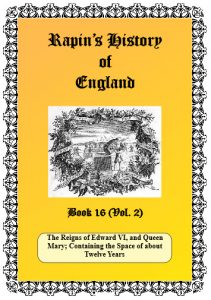BOOK XVI
The Reigns of Edward VI, and Queen Mary; Containing The Space of about Twelve Years
Chapter I
EDWARD VI
His disposition and good qualities. 1547
EDWARD VI, ONLY SON AND SUCCESSOR TO HENRY VIII, was nine years and three months old when he ascended the Throne by the death of the King his Father. His majority was fixed to the eighteenth year of his age, by the late King’s will, but he died before he came to it, after a short reign of six years and five months. The history therefore of these six years, as may be easily judged, will not be so much the history of the King himself, as of his Governors and Ministers.
There was reason to hope extraordinary things from this young Prince, had it pleased God to bless him with a longer life. He had an excellent memory, a wonderful solidity of mind, and withal, he was laborious, sparing no pains to qualify himself for the well governing of his Kingdom. At eight years of age, he wrote Latin letters to his father. French was as familiar to him as English. He learnt also Greek, Spanish, and Italian. After that, he applied himself to the liberal sciences, wherein he made an astonishing progress[1]. Cardan, who saw him in his fifteenth year, speaks of him as of the wonder of the age. The testimony of this (Italian) philosopher was the less suspicious, as it was after the young Prince’s death that he published his praises, and in Italy, where his memory was odious.
He Is Informed of His Father’s Death
As soon as Henry VIII, had resigned his last breath, the Earl of Hertford, and Sir Anthony Brown, were sent by the council, to give young Edward notice of it, and to bring him to London. He was then with his sister the Princess Elizabeth at Hertford, from whence the deputies conducted him to Enfield. Here they inform him of the King’s death (1547), and pay their respects to him as to their Sovereign. After that, they attended him to the Tower of London, where he was received by the council in a body, and proclaimed King the same date the 31st of January, 1547.
On the morrow, the Council met to settle the form of King Henry’s Government during the King’s minority. There was not much to be debated. The Parliament had empowered the late king, not only to settle the Succession by his will, but also to appoint what form of government he should think most proper, till his successor was capable of holding the reins himself. All therefore that was to be done, was to open his will and obey the contents.
